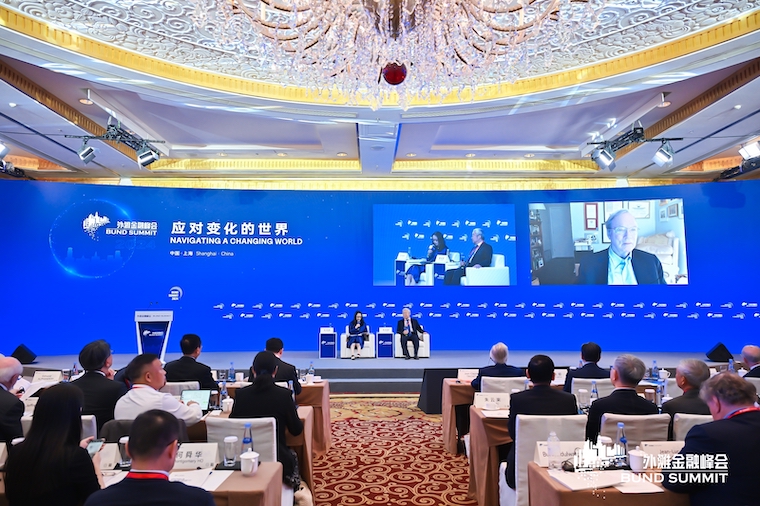

1. I think the only way to deal constructively with both the tension between the US and China bilaterally and the need for effective global economic leadership is to pursue a strategy of what I call functional decoupling. What that means is simply to set out different groups of issues, some of which will remain contentious and competitive and even confrontational between our two countries, but others of which we decide and agree to pursue in a more cooperative way.
So it seemed to me, we should always be looking for new issues that come on to the global economic agenda where there are no rules yet, and where it would be completely feasible for the US and China to work together from ground zero, from scratch, to put in place new rules, obviously, with the cooperation of other countries.
In trying to find a more stable path, both for bilateral relations between China and the United States, and for the world economy, it would be a critical step forward if China and the United States could agree to work together to develop new rules of the road.
Those issues obviously have security implications where both countries will continue to do things for security reasons. But they also have huge economic and social implications that are not related to security. The two countries can, and in my view, should pursue in a cooperative mode. And that, in turn, could lead the way to a new set of relationships between our countries where the world economy as a whole, and that’s what I would call functional decoupling--moving ahead on issues like cooperatively, while leaving disagreements on security and other issues. This is a two-way relationship, which I think is the only way toward a stable equilibrium.
2. The record of industrial policy in the United States is very poor. It has very seldom worked in the past. There are examples where government support has initiated major technological breakthroughs, like the internet, like radar in World War Ⅱ, but industrial policy as normally understood has not been at all successful in the United States. And my expectation would be that it will not work any better this time. President Biden was successful in getting congressional approval for funding for industrial policy, both in semiconductors and in some clean energy projects. They’re hoping to generate a lot of new investment. But even then, we don’t know if the products will be competitive. And that comes to then the big issue between our countries, or one of the big issues, which is so called overcapacity.
If China is producing a lot of electric vehicles, China may think that simply developing its competitive advantage, whereas the United States and others may say that’s building overcapacity. There’s nothing wrong with building production for export markets and to meet foreign demand, as well as to meet domestic demand. That’s not necessarily overcapacity. However, if that production is substantially promoted to heavy government subsidy, other preferences for domestic firm and discrimination against foreign firms, then there’s a real problem, which unfortunately, the WTO, even in its good days, was unable to handle. That’s why I put forward functional decoupling. I would hope that, ultimately, the United States and China would sit down, talk to each other about their respective industrial policy, try to be clear on what is legitimate to defend national security reasons and what is not legitimate when it’s purely for economic purposes, and thus it’s protectionism.

C. Fred BERGSTEN
Director Emeritus and Nonresident Senior Fellow, Peterson Institute for International Economics


1. But anyway, cooperation between China and United States is very important. If we accept that, then I think many specific issues would be solved relatively easily.
Unfortunately, I think Trump administration, to a certain extent, and Biden administration adopt sort of policy of containment rather than engagement. I think this kind of policy is entirely wrong, and it will not be successful. For example, so called “small yard, high wall” policy actually is a total failure. As Fred once mentioned, this kind of policy actually are encouraging, even forcing China to work harder on their own. Actually, this is what happened and China has been quite successful over the past few years in making some very important progress. Huawei is a very good example. America wants to kick Huawei out of a global supply chain, but China is a very big economy, and China has a very comprehensive economic system and hundreds millions of hard working workers. So we’ll be able to overcome all these problems.
I think the result of this “small yard, high wall” policy is not good, either for China or United States. At most, you can achieve so-called Pyrrhic victory. Both sides suffer from this. Maybe China will suffer more, but also for United States. Hopefully new administration will change this policy. They should accept Fred’s suggestion to strengthen the Sino-American cooperation.
2. Actually, there are two kinds of overcapacity. One is at macroeconomic level. In China, at macro economic level, China is not suffering from overcapacity. China’s problem is a lack of effective demand. So China has to use expansionary fiscal and monetary policy to stimulate economy to increase the amount, so that we can help to reduce the pressure on exporting sector. In this way, we can help United States and other countries. Actually, this is continuation of all the debate about RMB appreciation. Remember that actually we were on the same page. A chronic current account surplus is not good for China. It’s not in the long term interest of China. But this is another issue.
Now we are talking about the overcapacity with regard to EV, lithium battery, so forth. We really suffer from this sort of a sectoral overcapacity, and this kind of overcapacity should be resolved mainly by market. I don’t think the government is so wise that it can decide whether this is overcapacity or that is not overcapacity. The government has no this kind of ability.
Of course, there’s a problem with the foreign trade side. But we should separate industrial policy from trade policy, because these are two different issues. I entirely agree with Fred. Basically, WTO is silent on this issue and there’s no specific rules. Actually, I checked WTO rules before I come here to check whether there are any specific rules against the industrial policy. I fail to find any one. So we need to do work to complement to add something into WTO rules.
And lastly, I would emphasize that China is a strong supporter of WTO. China has tried its best to follow WTO rules.

YU Yongding
Chairman, Pushan Foundation; Academician, Chinese Academy of Social Sciences
Watch the highlights


